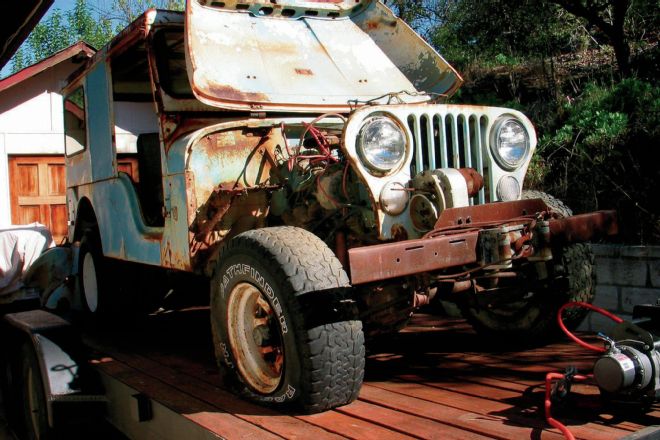
 Christian Hazel
Brand Manager, Four Wheeler
Christian Hazel
Brand Manager, Four Wheeler
Anyone can buy a shiny new 4x4 and pay a shop to barf catalog parts in, on, and under it. It takes a real demented wacko to seek out an abandoned pile of junk that hasn’t run in decades and that the aftermarket has virtually left behind -- something that’s been left to languish in a dusty field or leaky barn since the Carter administration. Thankfully for your entertainment, we’re just that sort of demented wacko. We’ve brought over a dozen forlorn and neglected off-road machines from apathetic owners and nursed them back to fighting form. We’ve gotten the short end of the stick on some transactions, made out like bandits on others, and courted tetanus and Hantavirus with each. And through it all, we’ve picked up some hard-earned tips and tricks unique to dragging home abandoned 4x4s most people wouldn’t even donate to a junkyard. So if you’re like us and your used vehicle search terms include phrases like “project, junk, missing, unique, character, or antique,” you’ll most likely use some of these retrieval and revival tricks on your next purchase. Check out some highlights from a recent purchase of a 1971 CJ-6 we picked up a while back. You’ll see more of this vehicle in subsequent issues of Four Wheeler as we make it a patina’d, no-frills, vintage-vib’d wheeler.
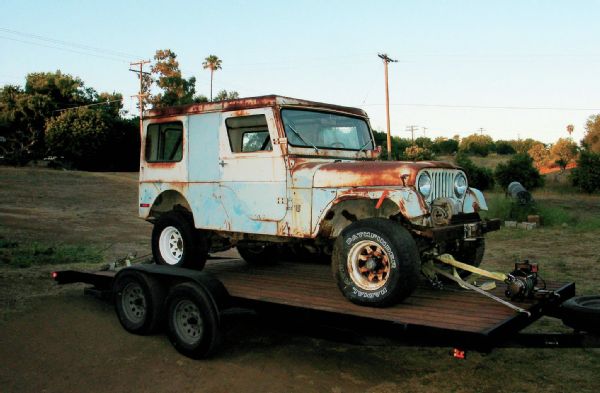
Years ago we rigged up a Warn 6,000-pound SDP (short drum portable) winch on a removable mount. Hooked to an Odyssey battery, it makes a great little removable trailer winch. Winch carefully and never rely on the vehicle’s brakes. Always use wheel chocks to keep your new purchase from rolling off the end of your trailer and into your tow rig. We use hardware store tie-downs, but we admit a Cinch Pack from Mac’s Custom Tie Downs would be a lot nicer.
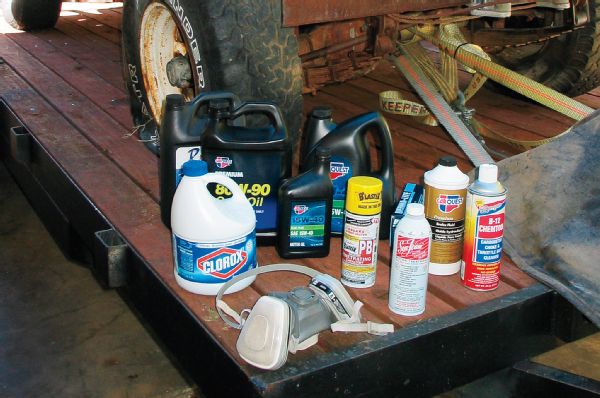 Trust nothing. That means new gear lube for the axles and gearboxes, enough engine oil and filters for two changes, fresh fuel and brake fluid, penetrating lube, carb cleaner, and rubber gloves. If your new purchase is piled high with rodent turds, you’ll also want a respirator (so you don’t breathe in the dried rodent urine) and some bleach mixture in a spray bottle to kill pathogens like Hantavirus, which can kill you.
Trust nothing. That means new gear lube for the axles and gearboxes, enough engine oil and filters for two changes, fresh fuel and brake fluid, penetrating lube, carb cleaner, and rubber gloves. If your new purchase is piled high with rodent turds, you’ll also want a respirator (so you don’t breathe in the dried rodent urine) and some bleach mixture in a spray bottle to kill pathogens like Hantavirus, which can kill you.
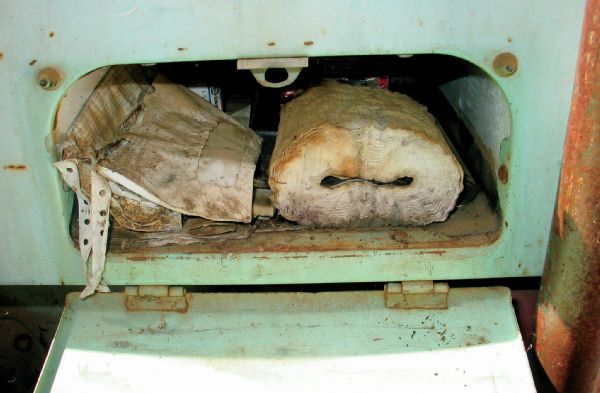 Most states aren’t very lenient on issuing titles without a bill or sale or existing VIN plate, so you’ll want to get all the paperwork you can for your vehicle and make sure it matches the VIN plate. If there are back-fees on the registration, factor those into the purchase price. Hopefully the paperwork included with your vehicle won’t conjure the same nasty images as ours.
Most states aren’t very lenient on issuing titles without a bill or sale or existing VIN plate, so you’ll want to get all the paperwork you can for your vehicle and make sure it matches the VIN plate. If there are back-fees on the registration, factor those into the purchase price. Hopefully the paperwork included with your vehicle won’t conjure the same nasty images as ours.
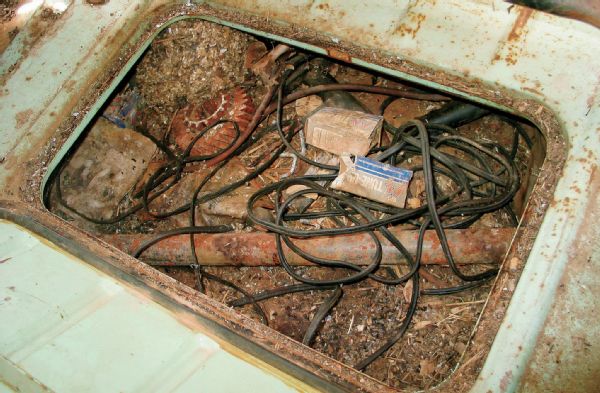 Old projects normally come with a bunch of spare parts. Ours was no exception. The seller even threw in about five pounds of rat turds, some duct tape, and electrical cords. We half expected to find a decomposed body in the back, but other than a dead rat carcass, most of the horror was of the mechanical variety.
Old projects normally come with a bunch of spare parts. Ours was no exception. The seller even threw in about five pounds of rat turds, some duct tape, and electrical cords. We half expected to find a decomposed body in the back, but other than a dead rat carcass, most of the horror was of the mechanical variety.
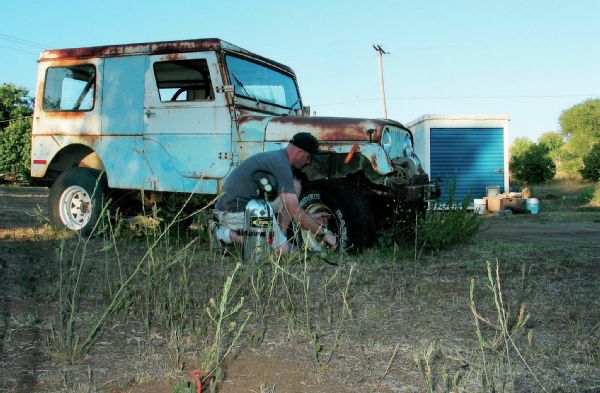 It may be tempting to wire, fuel, and fire up an abandoned vehicle at the time of purchase, but you really should trailer it home to revive it properly. Often, tires on vehicles that have sat for 10 or more years will be dry-rotted and probably won’t hold air for very long. Compressors are normally too slow to fill, so we always bring along our 10-pound Power Tank. The Power Tank inflates the tires fast enough that we get enough time to winch our purchase onto the trailer before they go flat again.
It may be tempting to wire, fuel, and fire up an abandoned vehicle at the time of purchase, but you really should trailer it home to revive it properly. Often, tires on vehicles that have sat for 10 or more years will be dry-rotted and probably won’t hold air for very long. Compressors are normally too slow to fill, so we always bring along our 10-pound Power Tank. The Power Tank inflates the tires fast enough that we get enough time to winch our purchase onto the trailer before they go flat again.
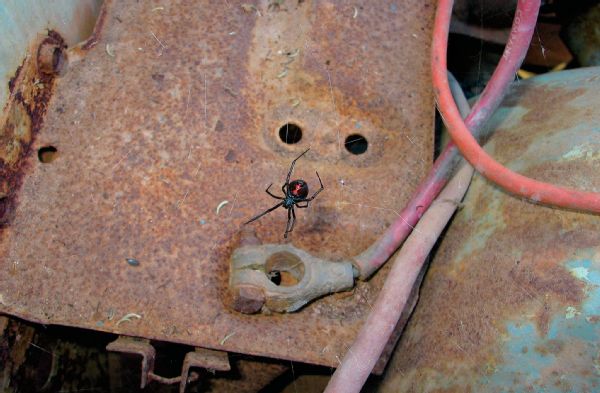 Unless you’re buying in the dead of winter, poke around carefully for live vermin and critters. We’ve found everything in vehicles we’ve dragged home from nesting mice to venomous spiders to snakes to live raccoons. If your garage is well sealed from your house, lighting off a bug bomb and closing the door for a while is a good way to kill spiders and creepy crawlies. You’re on your own if your rig is infested with raccoons.
Unless you’re buying in the dead of winter, poke around carefully for live vermin and critters. We’ve found everything in vehicles we’ve dragged home from nesting mice to venomous spiders to snakes to live raccoons. If your garage is well sealed from your house, lighting off a bug bomb and closing the door for a while is a good way to kill spiders and creepy crawlies. You’re on your own if your rig is infested with raccoons.
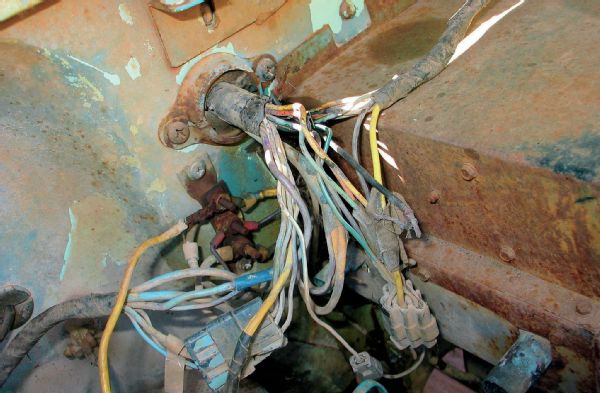 Don’t just stab in a battery and put power to the system. Give the wiring a good visual inspection first for any bare spots that could ground out or have the potential to arc. Wrap any suspect areas with electrical tape ‘til you can do a proper rewire. We’ve lost more than one electrical system this way. It’s also good practice to disconnect the ammeter gauge if the vehicle is so equipped. Just remove the leads to and from the ammeter and connect them together to bypass the gauge, which can often go bad and cause an electrical meltdown.
Don’t just stab in a battery and put power to the system. Give the wiring a good visual inspection first for any bare spots that could ground out or have the potential to arc. Wrap any suspect areas with electrical tape ‘til you can do a proper rewire. We’ve lost more than one electrical system this way. It’s also good practice to disconnect the ammeter gauge if the vehicle is so equipped. Just remove the leads to and from the ammeter and connect them together to bypass the gauge, which can often go bad and cause an electrical meltdown.
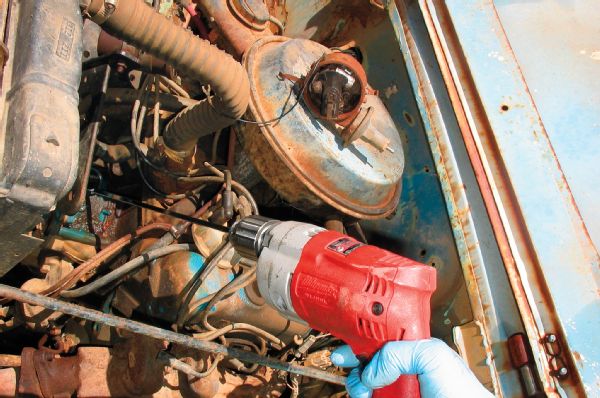 After only a few weeks of sitting most of the engine oil will have drained from the thrust surfaces and back into the pan. You’ll want to remove the distributor and rig up an engine preluber to get oil up into the galleys so the engine doesn’t run dry during its first fire. For most GM engines, it’s as simple as hacking off the blade of a long-shaft flathead screwdriver, but dedicated prelube tools are available for most Chrysler, Ford, and other brands at your local auto parts store. We had to do some work to get our distributor to spark, so eventually we’ll toss it and upgrade to a DUI from Performance Distributors.
After only a few weeks of sitting most of the engine oil will have drained from the thrust surfaces and back into the pan. You’ll want to remove the distributor and rig up an engine preluber to get oil up into the galleys so the engine doesn’t run dry during its first fire. For most GM engines, it’s as simple as hacking off the blade of a long-shaft flathead screwdriver, but dedicated prelube tools are available for most Chrysler, Ford, and other brands at your local auto parts store. We had to do some work to get our distributor to spark, so eventually we’ll toss it and upgrade to a DUI from Performance Distributors.
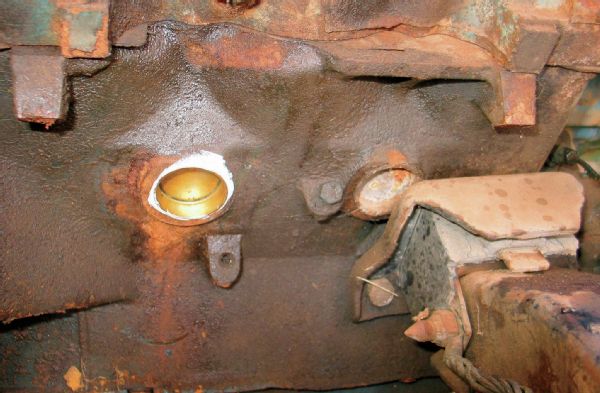 It sometimes takes a bit of contorting and/or removal of an engine mount or two, but we’ve normally been able to replace bad core plugs without removing the engine. We slather some Permatex thread sealant around the perimeter of the core plug and use an appropriately sized socket to drive it in.
It sometimes takes a bit of contorting and/or removal of an engine mount or two, but we’ve normally been able to replace bad core plugs without removing the engine. We slather some Permatex thread sealant around the perimeter of the core plug and use an appropriately sized socket to drive it in.
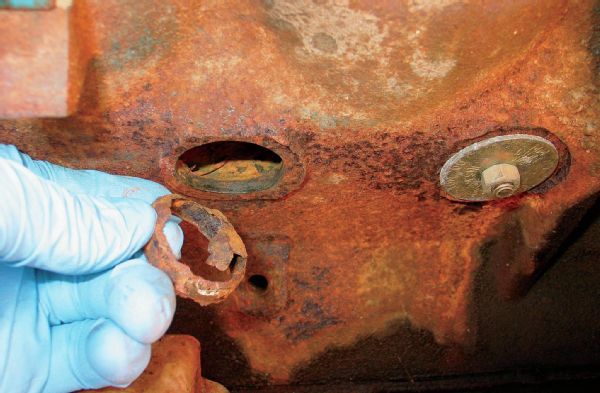 Make sure the cooling system is up to snuff. Most abandoned rigs we’ve bought had cooling systems filled with straight water, not antifreeze. Without antifreeze, the water can expand in the block and radiator. In fact, the last three or four vehicles we purchased had core plugs that were either popped from water freezing in the block or rotted clear through. Always check the core plugs before you fire it up.
Make sure the cooling system is up to snuff. Most abandoned rigs we’ve bought had cooling systems filled with straight water, not antifreeze. Without antifreeze, the water can expand in the block and radiator. In fact, the last three or four vehicles we purchased had core plugs that were either popped from water freezing in the block or rotted clear through. Always check the core plugs before you fire it up.
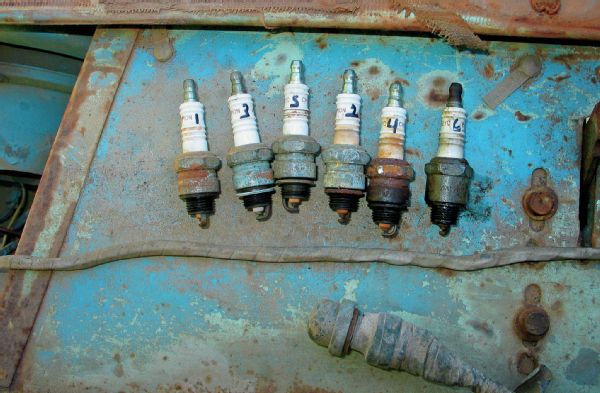 Remove all the plugs and spray some Marvel’s Mystery Oil or other lubricant into the cylinders and let it sit. We usually give each cylinder a good dose to help free sticky rings before cranking the engine over. After letting the cylinders soak for a couple hours, try to gently rotate the engine by hand with the plugs removed. If it’s free, hook up your battery and spin the engine over a few times to purge the excess lube oil before reinserting the spark plugs.
Remove all the plugs and spray some Marvel’s Mystery Oil or other lubricant into the cylinders and let it sit. We usually give each cylinder a good dose to help free sticky rings before cranking the engine over. After letting the cylinders soak for a couple hours, try to gently rotate the engine by hand with the plugs removed. If it’s free, hook up your battery and spin the engine over a few times to purge the excess lube oil before reinserting the spark plugs.
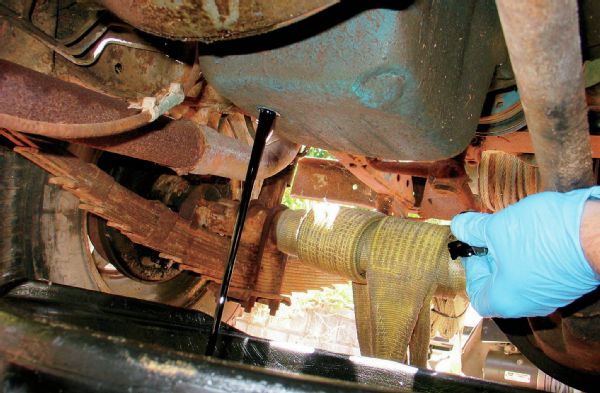 We always drain and refill the crankcase with fresh oil and spin on a new oil filter for good measure. A good trick is to substitute one quart of engine oil for ATF to scour the engine clean since ATF has higher detergent qualities than engine oil. After you’ve run the engine for a while, you can do a second oil change for safe measure. We also try to change the tranny oil before firing the engine for the first time since some tranny components spin even with the engine in Neutral or Park.
We always drain and refill the crankcase with fresh oil and spin on a new oil filter for good measure. A good trick is to substitute one quart of engine oil for ATF to scour the engine clean since ATF has higher detergent qualities than engine oil. After you’ve run the engine for a while, you can do a second oil change for safe measure. We also try to change the tranny oil before firing the engine for the first time since some tranny components spin even with the engine in Neutral or Park.